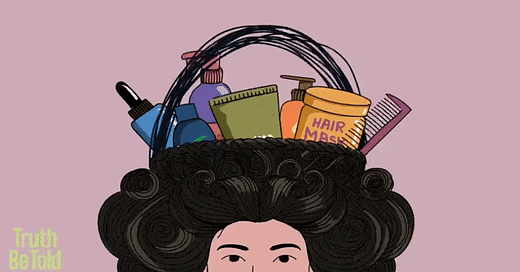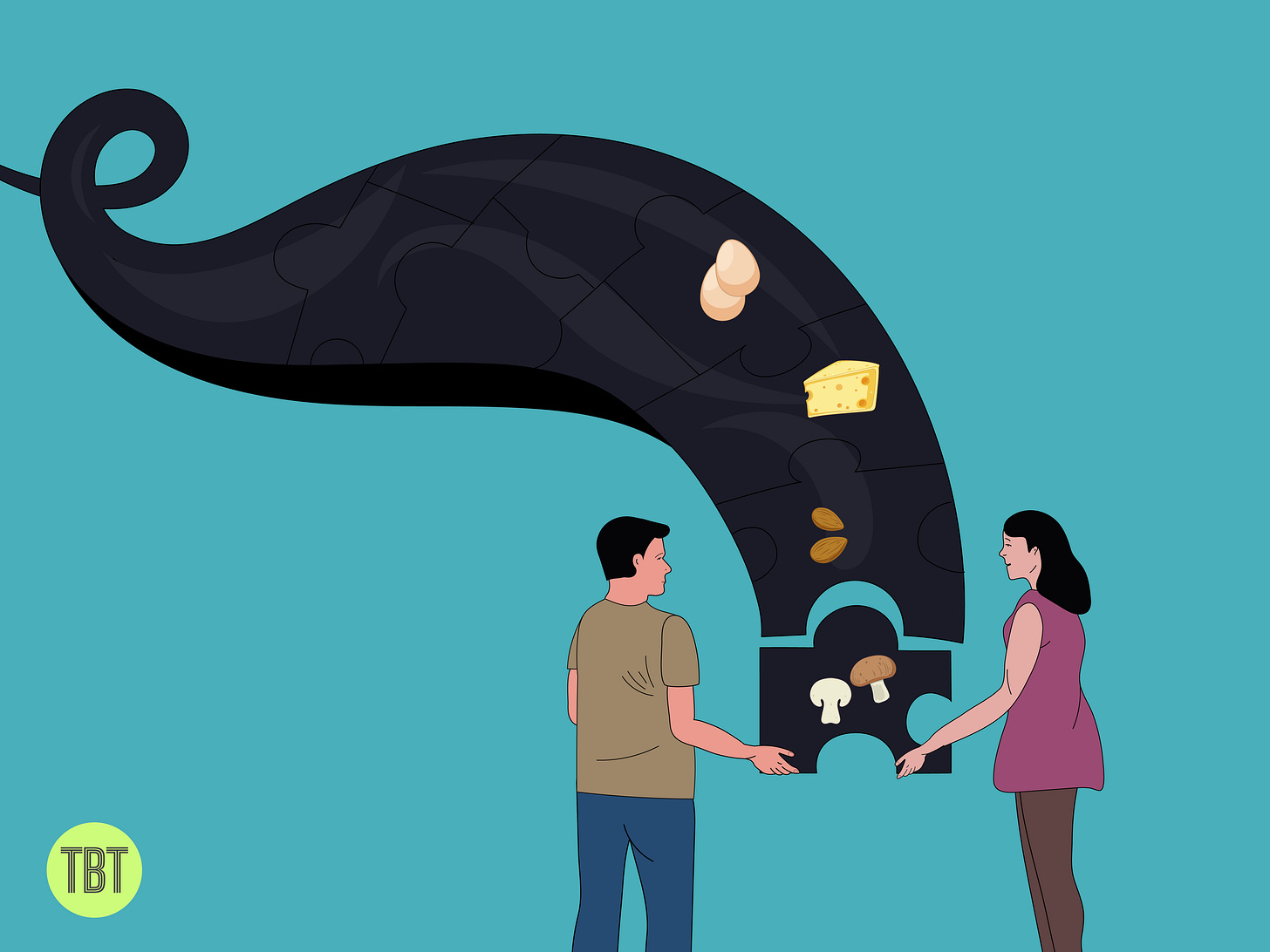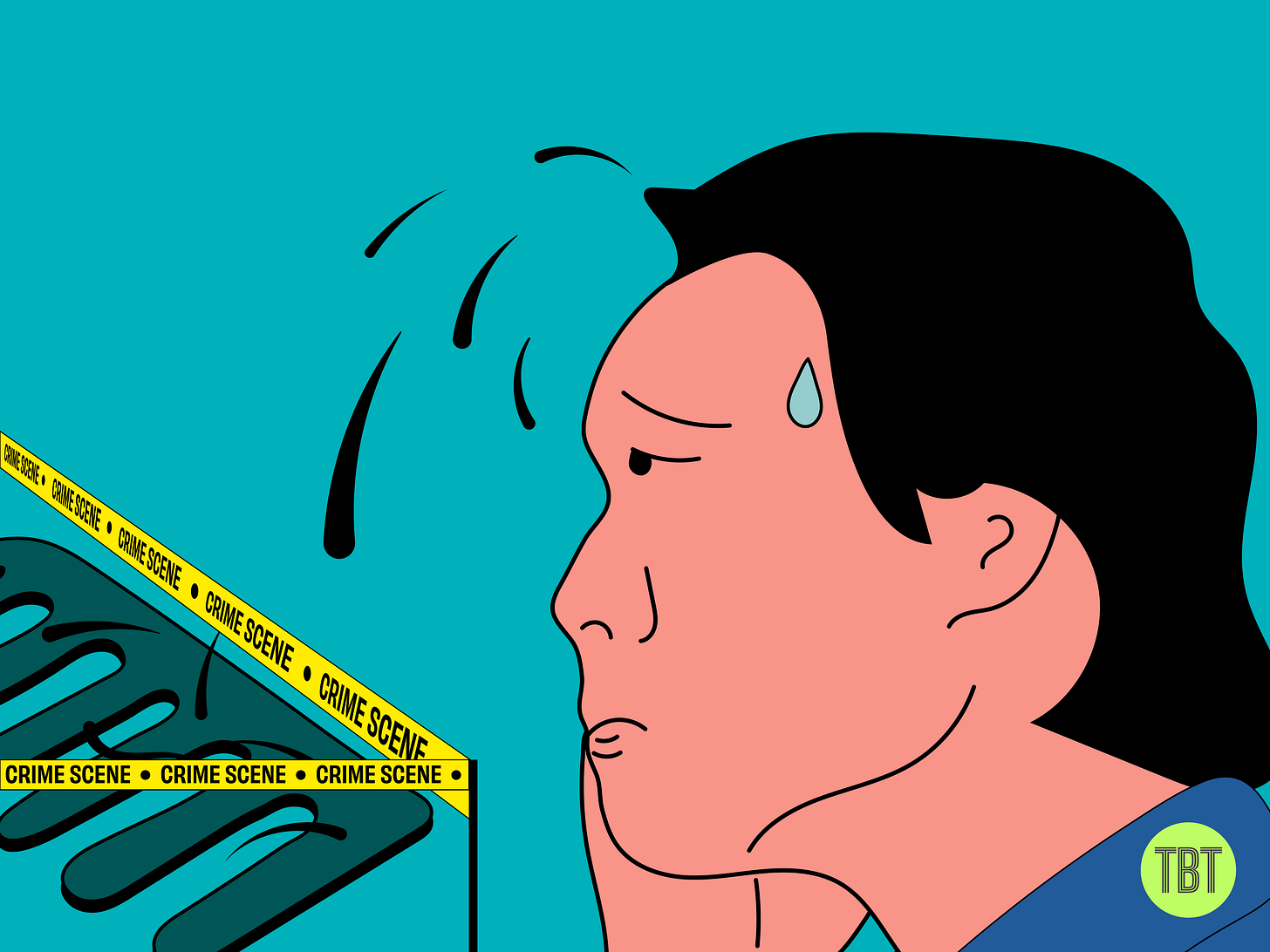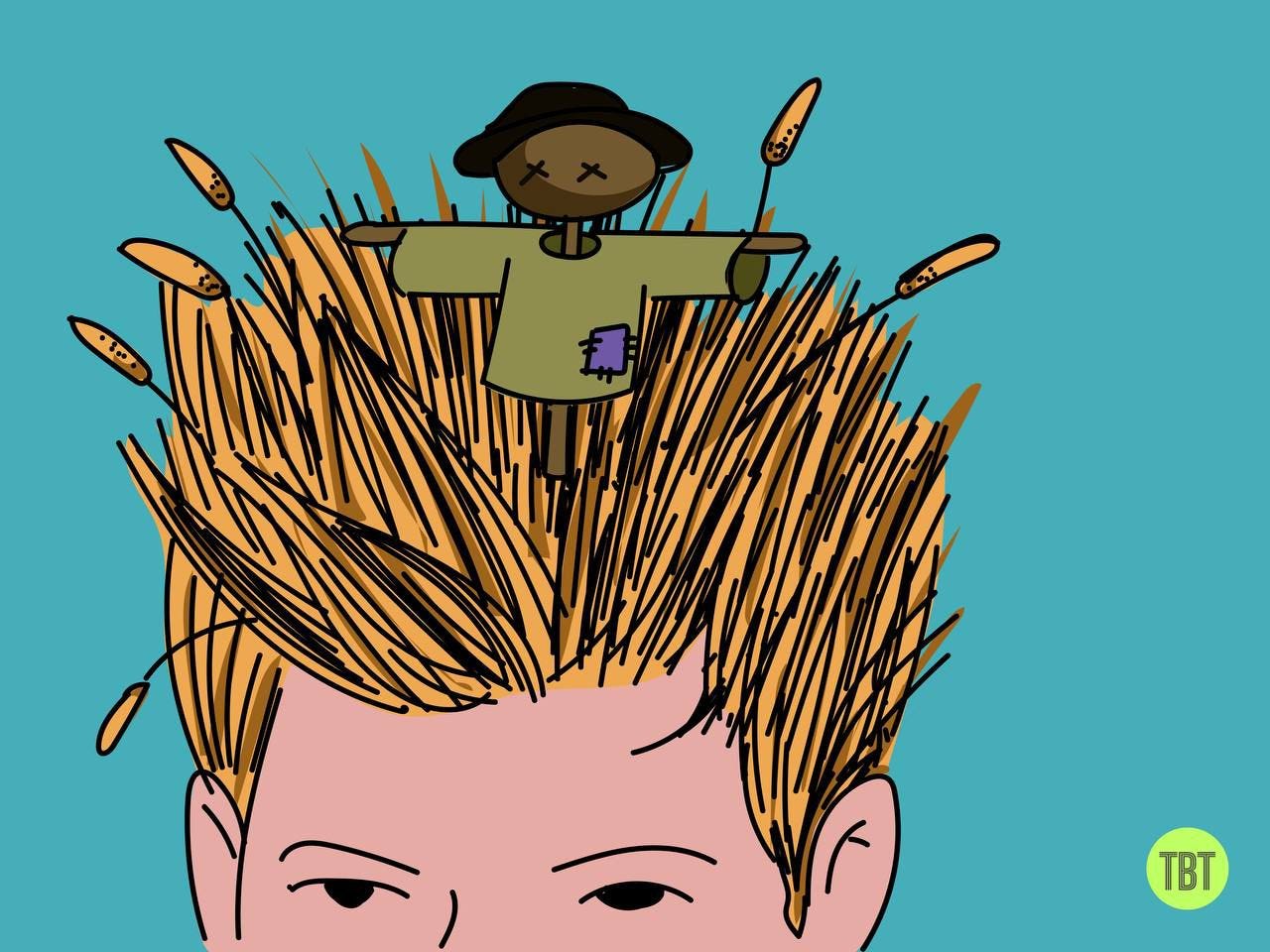Welcome to Truth Be Told, the weekly food and fitness newsletter published by The Whole Truth Foods.
Editor’s note: Today’s piece by Dr. Namita Chopade (MD Dermatology) is a comprehensive guide on hair care, cutting through the noisy myths and marketing hype to bring you science-backed tips. From nutrition to product selection, this article should help you understand what really works for healthier hair.
PS: Dr Chopade had previously written a guide for this newsletter on skincare, which you can read here.
Possibly nothing gets more attention in the cosmetic well-being industry than human hair does. Right from trying to increase the shine and density of the hair on your head, to making sure they retain a youthful shade for as long as possible, a myriad of healthcare products and tips litter the market today.
But how do you know what to believe and stick with? Do you really need to spend hours every week trying to care for your hair health?
Let's explore the science-backed truths of hair care, debunk common myths, and provide practical advice for maintaining healthy, beautiful hair—in 26 pointers.
I. The Hair-Healthy Diet
Your hair's health begins from within. The saying "you are what you eat" is particularly true for hair health. Think of your hair as a reflection of your overall health – when you nourish your body with the right nutrients, your hair will thank you by looking shiny, strong, and vibrant.
Here are the four key nutrients that matter most for hair health:
1. Iron: It’s the most crucial nutrient for hair health. It helps red blood cells carry oxygen to your hair follicles (the tiny sacs in the skin where hair grows). A lack of iron can lead to anaemia, a major cause of hair loss, particularly in women.
Incorporate iron-rich foods like spinach, lentils, and red meat (if possible) into your diet to ensure your hair gets the oxygen it needs. Dried nuts are a great source of iron as well.
2. Vitamin B12: While all vitamins are necessary for general health, vitamin B12 is particularly important for hair. It aids in the production of red blood cells, and its deficiency can lead to hair loss and premature greying.
You can find B12 in foods like eggs, fish, and fortified cereals.
3. Proteins: Hair is primarily made of a protein called keratin. Therefore, consuming enough protein is crucial for hair growth and repair.
Protein-rich foods like chicken, fish, beans, and nuts can help provide the building blocks your hair needs to stay healthy and strong.
4. Calcium is not just for bones: While calcium is well-known for its role in bone health, it's also essential for hair growth. It helps in the transport of all other nutrients to hair follicles and reduces premature greying of hair. Dairy products, leafy greens, and almonds are excellent sources of calcium.
It's important to note that while hair is an important aspect of our appearance, it's not vital for survival. When your body is low on nutrients, it prioritises vital organs and systems over hair. As a result, your hair receives nutritive benefits last, making it more susceptible to nutritional deficiencies.
If you suspect your diet lacks essential nutrients, focus on improving your overall nutrition before seeking medical help for hair issues.
II. The Hair Care Myths
Now that we've covered the internal factors, let's turn our attention to external care. The world of hair care is full of myths and misconceptions that can mislead you in your quest for healthy hair. Let's debunk some of the most common hair care myths to help you separate fact from fiction.
5. The daily shampooing debate
Myth: Shampooing daily is always bad for your hair.
Truth: The ideal shampooing frequency depends on your hair type and lifestyle. For some, daily washing can strip natural oils (sebum produced by your scalp to protect and moisturise hair), causing dryness. However, those with oily hair or who exercise frequently may benefit from daily shampooing. Listen to your hair's needs.
6. The grey hair plucking myth
Myth: Plucking one grey hair causes more to grow.
Truth: Grey hair occurs due to a loss of pigment in individual hair follicles, typically due to ageing or genetic factors. Plucking one grey hair doesn't affect the colour of surrounding hairs or stimulate more grey hair growth. Each hair follicle operates independently.
7. The dandruff misconception
Myth: Dandruff is caused by a dry scalp.
Truth: Dandruff is often caused by an oily scalp, yeast overgrowth, or sensitivity to hair products, not dryness. An oily scalp can lead to an overgrowth of a naturally occurring fungus which causes dandruff. This is why specialised anti-dandruff shampoos, which target these issues, are effective in managing dandruff.
8. The oiling myth
Myth: Oiling your hair reduces hair fall.
Truth: Excessive oiling can actually promote dandruff by creating an environment for fungal growth on your scalp. That’s because oil can trap heat and moisture, creating ideal conditions for fungi to thrive. While massaging your scalp can improve blood flow, the oil itself doesn't significantly reduce hair fall.
9. The natural product fallacy
Myth: Natural products are always better for your hair.
Truth: Not all natural products are effective or safe for everyone. Some natural ingredients can cause allergic reactions or damage to certain hair types. It's important to choose products based on your specific hair type and needs, regardless of whether they're natural or synthetic.
For example, many people apply lemon juice directly on the scalp to get rid of dandruff. However, it is highly acidic and can lead to severe scalp irritation.
10. The cold water rinse myth
Myth: Rinsing with cold water makes hair healthier.
Truth: While cold water can make hair look temporarily shinier by causing the outer layer of the hair—the cuticle—to lie flat, reflecting more light, it doesn't improve overall hair health. The temperature of your final rinse doesn't significantly impact long-term hair condition or structure.
11. The conditioner misconception
Myth: Conditioner is only for dry hair.
Truth: All hair types can benefit from conditioners. Conditioners work by coating the hair shaft, helping to retain moisture, reduce friction between hairs, and protect against environmental damage.
III. Choosing the Right Shampoo
With the myths cleared up, let's focus on one of the most essential hair care products: shampoo. Choosing the right shampoo can make a significant difference in your hair's health and appearance. Here's what you need to know to make an informed choice.
12. Understanding shampoo's role: Any shampoo's primary function is cleansing your hair and scalp of dirt, dead cells, and oil. It's important to remember that shampoo doesn't prevent hair fall.
When you see 'anti-hair fall' on a shampoo label, it typically means the shampoo is milder in action. The same applies to other benefits proposed by shampoos beyond basic cleansing.
13. Cosmetic vs. medicated shampoos: You'd broadly find two categories of shampoos available in the market.
First, cosmetic shampoos: These are meant for regular use and are typically pH balanced to a neutral 5.5—which is close to the natural pH of hair and scalp—making them suitable for daily use on normal skin.
Second, medicated shampoos: These help treat specific scalp conditions. When choosing a medicated shampoo, know what to look for:
For dandruff: Shampoos with ketoconazole, an antifungal medication. Using a Ciclopirox olamine cream in conjunction can be beneficial.
For diagnosed psoriasis (a skin condition that causes red, itchy, scaly patches): Coal tar-based shampoos can help manage symptoms.
For pimples or folliculitis (inflammation or infection of hair follicles) on the scalp: Betadine-based shampoos.
For oily scalp: Salicylic acid-based shampoos work to remove excess oil.
If you're unsure if a medicated shampoo is for you, it's best to consult a dermatologist beforehand.
Now let's look at some key ingredients of shampoos:
14. Sulphates are surfactants that help remove oil and dirt. While sulphate-free shampoos are milder and suitable for daily use or for those with allergies, they are less effective against dandruff. For deep cleansing, a sulphate-containing shampoo can be beneficial.
15. Parabens are a type of preservative added to shampoos. They have a controversial reputation regarding their carcinogenic nature, but it's crucial to note that parabens are generally considered safe in the concentrations used in hair products. You should avoid sulphates or parabens if you have a known allergy to them, though.
16. Beware of trendy ingredients: Be wary of shampoos containing ingredients like beer or onion extract. These are often marketed with bold claims, but there's no scientific evidence supporting their effectiveness in promoting hair growth or health. At best, they might leave your hair looking a bit shinier.
17. Price vs. effectiveness: Expensive doesn't always mean better. For example, many salons recommend special shampoos after treatments like keratin procedures.
These shampoos, often costing 3-4 thousand rupees, are essentially similar to other sulphate-free shampoos. Their main feature is minimal lather, which allows treatment chemicals to stay on hair longer. You can often substitute these with good, inexpensive sulphate-free shampoos from the pharmacy.
IV. How to Wash
Now that you've selected the right shampoo, it's crucial to know how to use it effectively. Proper washing techniques can enhance the health of your hair and scalp. Let's explore the best practices for washing your hair.
18. Washing frequency: How often you should wash your hair depends on your hair type, scalp condition, and lifestyle. Generally, washing 2-3 times a week is sufficient. However, during summer or if you have a particularly oily scalp, daily washing is acceptable. Use a mild shampoo and always follow up with a conditioner to prevent dryness.
19. Proper washing techniques:
With shampooing, focus on the scalp and massage gently for 2-3 minutes to ensure thorough cleansing.
For anti-dandruff shampoos, leave them on the scalp for at least 5 minutes to allow the active ingredients to work.
20. The importance of conditioner: After using a sulphate shampoo or any strong cleanser, a conditioner helps restore moisture and oil, preventing frizziness and dryness. Apply conditioner to the hair shaft—not the scalp—and leave for about 5 minutes before rinsing. This helps keep your hair moisturised without making your scalp oily.
V. Other Popular Hair Care Products
Beyond shampoo and conditioner, there's a wide array of hair products available. Understanding these products and how to use them correctly can help you achieve your hair goals. Let's examine some popular hair products and their effects.
21. Hair serums: These lightweight products enhance your hair's appearance, manageability, and health. There are two main types:
a) Cosmetic serums: They are designed to improve the appearance and feel of your hair. They help reduce frizz, dryness, and add a beautiful lustre, making your hair appear healthier and shinier. Opt for a serum that contains moisturising ingredients like argan oil, jojoba oil, or silicone.
Note that these serums should be applied only to the hair shaft and not to the scalp. This prevents the hair from looking greasy and weighed down.
For best results, apply the serum to damp hair. This allows the serum to lock in moisture, giving your hair a smooth and glossy finish.
b) Medicated serums: They are formulated to address specific hair concerns such as hair fall and thinning. These serums contain active ingredients that promote hair growth and reduce hair fall by targeting the scalp and hair follicles.
Unlike cosmetic serums, medicated serums need to be applied directly to the scalp. This ensures that the active ingredients reach the hair follicles, where they can have the maximum effects.
When considering using medicated serums, look for active ingredients such as anagain, redensyl, capixyl, and caffeine. All of these work to promote hair growth, prolong the life cycle of hair, or strengthen the hair strand in some way. Along with these ingredients themselves, the concentration of each in a serum plays a crucial role in its effectiveness.
22. Proper serum application: Use about 1mL per day or twice daily. Consistency is key, especially for medicated serums. Hair growth treatments often take several months to show visible results, so patience and regular application are essential.
23. The truth about hair gummies: Despite marketing claims, these are just multivitamin supplements with added sugar. You're better off taking regular multivitamin tablets from a pharmacy.
24. Using styling products safely:
When using styling products like wax and gel, it's crucial to apply them only to the hair shaft, not the scalp. Proper use on strands doesn't cause hair fall, but leaving these products on can block hair follicles and lead to dandruff.
They can also attract dirt, making hair appear greasy.
Always wash out these products the next day to maintain scalp health and prevent buildup.
Remember, moderation and proper hygiene are key to using styling products effectively without compromising hair health.
25. The impact of heat styling: Hair dryers can damage hair structure, as high temperatures can weaken the hair cuticle, which can lead to split ends and breakage. Heat can also remove moisture from the hair, causing it to become dry and frizzy.
If you must use one:
Choose the lowest heat setting possible—room temperature, preferably.
Use heat-resistant sprays for some protection, but don't rely on them entirely.
Whenever possible, let your hair air-dry when possible to preserve its natural strength and moisture.
26. The benefits of hair masks: These are intensive moisturisers that offer deeper conditioning than regular conditioners. They penetrate the hair shaft more deeply, repairing and nourishing from within. They're especially good for dry, damaged, or colour-treated hair. Use once a week or fortnightly for improved hair texture and hydration.
In the quest for beautiful, healthy hair, it’s easy to get caught up in the latest trends and fads. However, understanding the basics can help you cut through the noise and focus on what works. Remember, consistency is key, and taking care of your hair doesn't have to be complicated. Stick to science-backed advice and listen to your hair’s needs.








Interesting🤣🤣🤣